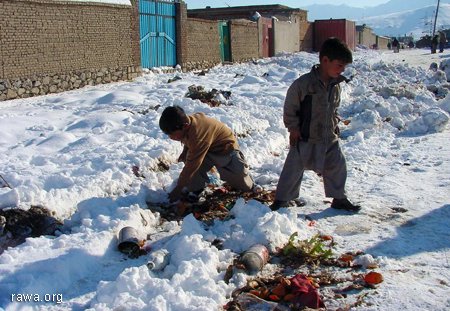KABUL - Soaring staple food prices have pushed 1.3 million previously food-secure people in rural Afghanistan into high risk food-insecurity, according to the latest assessment by the UN World Food Programme (WFP).
In urban areas about 900,000 Afghans are also estimated to have been dragged into acute food-insecurity over the past few months due to spiralling food prices and food shortages.

UNICEF, Oct.26, 2007: "Afghan children on the brink of catastrophe"
Investigations into the exact number of people pushed into food-insecurity in urban areas will be conducted in the future, WFP said.
Staple food prices have increased by 100 percent in global markets and by over 60 percent in Afghan markets in the past 12 months, the UN Food and Agriculture Organisation (FAO) reported.
Recently about 6.5 million out of an estimated 24.5 million people in Afghanistan were considered food-insecure by FAO – a figure which has increased considerably in the past three months.
Appeal for assistance
Rick Corsino, WFP's representative in Afghanistan, said: "We believe humanitarian assistance to this group [1.3 million] of people is justified and necessary until next harvest season."
The government of Afghanistan and the UN are currently working on a joint appeal for assistance through which donors will be asked to help tackle the growing food crisis in the country.
The joint appeal will be made public in the near future, but awareness will be raised among donors about its importance in advance, Corsino told reporters in Kabul on 14 January.

There are staggering: 60,000 children in Afghanistan are addicted to drugs, and another 100,000 are disabled and otherwise severely affected physically due to prolonged conflicts in the country.
In an effort to meet the increased needs of food-insecure people WFP has agreed to provide 40,000 metric tonnes (mt) of additional wheat (worth US$30 million) on top of its 175,000 mt of food aid to Afghanistan in 2008.
The additional food assistance will be distributed in close cooperation with government bodies through food-for-work projects in the most vulnerable areas.
"Vulnerable"
Both the UN and the government of Afghanistan have given assurances that the country is not facing a "famine" and/or a similar critical situation.
However, there is an increasing need for a robust humanitarian intervention to avert a further deterioration in food-insecurity, particularly among vulnerable communities and during the winter, aid agencies say.
"When people fall into high risk food-insecurity they become very vulnerable to additional shocks," warned Corsino, adding: "Vulnerable people could be pushed to extreme situations" if humanitarian relief is not provided.
The UN humanitarian intervention will only mitigate the suffering of some vulnerable communities and will not have a dramatic impact on food prices in Afghanistan, Rick Corsino said.
Afghanistan requires multiple long-term solutions to overcome its growing food challenges, he said.



